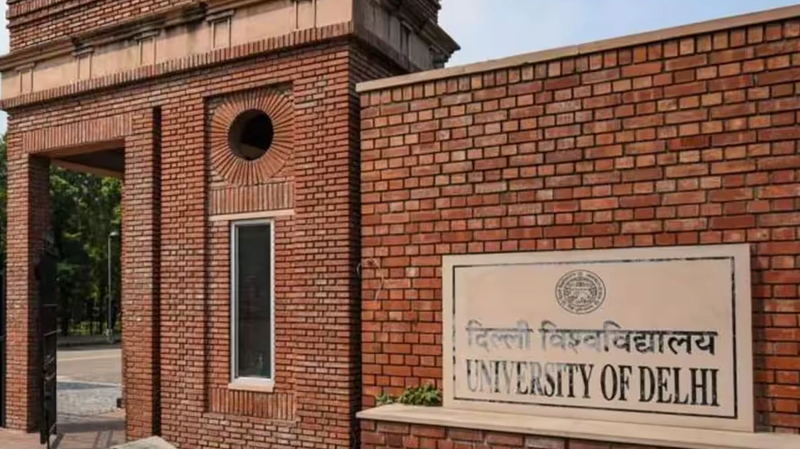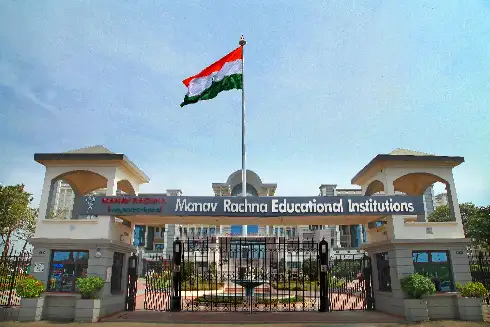Delhi, officially the National Capital Territory (NCT) of Delhi, is a union territory of India that contains New Delhi, the nation’s capital. Located in Northern India, Delhi is bordered by Haryana on the north, west, and south, and by Uttar Pradesh (UP) on the east.
As the political, cultural, and educational hub of India, Delhi attracts students from across the globe. Every year, thousands of students from Nepal, Bhutan, Africa, and Southeast Asia choose Delhi for its world-class universities, affordable education, cultural familiarity, and dynamic student life.
For Nepali students in particular, Delhi offers the perfect balance of academic excellence, career opportunities, and easy accessibility, making it one of the most preferred higher education destinations in India.
Why Study in Delhi?
1. Top-Quality Universities & Colleges
Delhi is home to some of India’s most prestigious universities and institutes, many of which are ranked highly in national and international rankings. These institutions provide Nepali students with access to world-class faculty, research opportunities, and career pathways.
Here are some of the top universities and colleges in Delhi:

- University of Delhi (DU) – One of the highest-ranked universities in India, DU offers a wide variety of undergraduate and postgraduate programs in Arts, Commerce, Science, Management, and Law. Its North Campus and South Campus colleges are especially popular among international students. For more information of DU read : Univerisity on Delhi
- Jawaharlal Nehru University (JNU) – Globally recognized for Social Sciences, International Studies, and Research. JNU is known for its strong academic culture and diverse student community.
- Jamia Millia Islamia (JMI) – A central university famous for Journalism, Mass Communication, Law, Engineering, and Humanities. JMI is one of the top choices for international students.
- Indraprastha Institute of Information Technology (IIIT-Delhi) – A premier research-driven institute focusing on Computer Science, Artificial Intelligence, Data Science, and Information Technology.
- Indian Institute of Technology Delhi (IIT Delhi) – Consistently ranked among the world’s best institutes for Engineering, Technology, and Research. IIT Delhi offers top-notch programs and international collaborations.
- Guru Gobind Singh Indraprastha University (IP University) – Known for its professional courses in Engineering, Management, Law, and Health Sciences.
- Ambedkar University Delhi (AUD) – Popular for its Social Sciences, Liberal Arts, Development Studies, and Psychology programs.

- Manav Rachna Educational Institutions – A leading private university offering programs in Engineering, Management, Commerce, Media Studies, and Healthcare.
MRIIRS is the first NAAC A++ certified deemed to be university . Manav Rachna is the group of 4 different institution that serve different educational purpose like Manav rachna internation instituion of research and studies , Manav racha univeristy a state private university, Manav rachna dental colleges and hospital and Manav rachna centre for distance and online education .

- Amity University, Noida (Delhi NCR) – A globally recognized private university located in Delhi NCR, known for Business, Engineering, Law, Biotechnology, and International Programs.
These institutions consistently feature in India’s NIRF rankings and many also enjoy global recognition, offering Nepali students both academic prestige and promising career opportunities.
2. Affordable & Diverse Education
One of the biggest advantages of studying in Delhi for Nepali students is its affordability compared to Western countries and even some private universities in South Asia.
- Tuition Fees: Depending on the course and institution, tuition fees in Delhi typically range from ₹40,000 to ₹2,50,000 per year (approx. NPR 64,000 to NPR 400,000). This makes Delhi one of the most budget-friendly higher education destinations for international students.
- Wide Range of Programs: Delhi universities and colleges offer diverse academic programs including:
- Engineering & Technology (IIT Delhi, DTU, NSUT)
- Medicine & Health Sciences (AIIMS, IP University)
- Business & Management (DU, Amity, Manav Rachna)
- Law (NLU Delhi, JMI, DU Faculty of Law)
- Computer Science & IT (IIIT-Delhi, IIT Delhi)
- Arts, Design & Journalism (NIFT, JMI, DU, National School of Drama)
- Social Sciences & Humanities (JNU, Ambedkar University, DU)
- Engineering & Technology (IIT Delhi, DTU, NSUT)
- Easy Accessibility from Nepal:
Delhi is geographically close to Nepal, making travel convenient and economical:- By Air: A direct flight from Kathmandu to Delhi takes just about 1 hour, with affordable ticket options available year-round.
- By Road: For students from the Terai region or those on a tighter budget, direct buses connect Kathmandu (e.g., from Swoyambhu) and various cities in Nepal to Delhi, including night buses that are cost-effective and convenient.
- By Air: A direct flight from Kathmandu to Delhi takes just about 1 hour, with affordable ticket options available year-round.
- Cultural Familiarity:
Delhi has a large Nepali-speaking community due to migration for jobs, trade, and education. For Nepali students, this means they never feel too far from home. You’ll find Nepali restaurants, cultural associations, and social groups across Delhi, ensuring a sense of belonging.
This blend of low cost, diverse academic choices, and easy connectivity makes Delhi an ideal higher education destination for students from Nepal.
3. Career Opportunities
Studying in Delhi opens doors to diverse and rewarding career opportunities both in India and abroad. Being the national capital, Delhi offers students direct access to industries, institutions, and organizations that shape the future of the country.
- Corporate Jobs: Delhi is home to major IT companies, financial institutions, multinational corporations, consulting firms, and a thriving startup ecosystem. Graduates from Delhi universities often secure placements in Infosys, TCS, Deloitte, EY, Accenture, and global MNCs.
- Government & Public Policy Careers: As the political heart of India, Delhi provides unique opportunities in government ministries, public policy think tanks, and international organizations like UNDP, WHO, and UNESCO.
- Media & Journalism: With leading media houses such as NDTV, India Today, Hindustan Times, and Times of India headquartered in Delhi, students of Jamia Millia Islamia (JMI), DU, and other institutions gain direct pathways into the media, communications, and journalism industry.
- Law & Judiciary: Delhi hosts the Supreme Court of India, Delhi High Court, and top-tier law firms, offering law students unmatched exposure and career prospects in litigation, corporate law, and public service.
- Research & NGOs: Many of India’s think tanks, NGOs, and research institutes (like Observer Research Foundation, TERI, and Centre for Policy Research) are located in Delhi, providing opportunities for students in policy research, social development, and international relations.
Global & Local Career Advantages
A degree from Delhi’s recognized universities carries significant weight worldwide. Since most universities are validated by the University Grants Commission (UGC) of India, their degrees are internationally accepted. This helps Nepali students pursue master’s and higher studies in the USA, Australia, and Europe with ease.
Additionally, these reputed degrees are highly valued in Nepal, making it easier for graduates to secure jobs in government sectors, private companies, banks, NGOs, and international organizations back home.
In short, studying in Delhi not only provides direct career opportunities in India but also builds a strong foundation for global education and employment prospects.
4. Cultural Comfort & Accessibility for Nepali Students
One of the biggest reasons Nepali students prefer Delhi for higher studies is the sense of cultural familiarity and comfort the city provides. Unlike many international destinations, Delhi feels close to home both geographically and culturally, making it easier for students to adjust.
- Proximity to Nepal: Delhi is extremely well-connected to Nepal. Direct flights from Kathmandu to Delhi take only about an hour, while affordable bus services run from Kathmandu, Pokhara, and major towns in the Terai region directly to Delhi. For students on a tighter budget, train routes via Gorakhpur or Raxaul also provide convenient options. This proximity means students can easily visit their families during holidays or emergencies without spending a fortune.
- Cultural Similarity: Festivals like Dashain, Tihar, Holi, and Diwali are celebrated in Delhi with the same enthusiasm as in Nepal. The presence of a large Nepali community in areas like Munirka, Majnu ka Tilla, and Lajpat Nagar ensures that students never feel disconnected from their roots. Temples, cultural associations, and community gatherings allow students to continue celebrating their traditions.
- Food Choices: Food is one of the strongest cultural connectors. Delhi offers plenty of options for Nepali students, from momo stalls and Nepali eateries in Lajpat Nagar and North Delhi to university canteens serving affordable vegetarian and non-vegetarian meals. Popular Nepali dishes like momo, thukpa, chowmein, and dal-bhat are easily available, ensuring students enjoy the taste of home.
- Language: Language is rarely a barrier in Delhi. Most universities conduct courses in English, while Hindi is widely spoken and relatively easy for Nepali students to understand due to linguistic similarities. Additionally, in areas with a high Nepali population, students can communicate in Nepali itself, making the transition smoother.
Overall, Delhi offers Nepali students the perfect balance of cultural familiarity and modern city life, helping them adapt quickly and focus on their academic journey without feeling homesick.
5. Weather & Living Conditions in Delhi
Delhi offers a dynamic lifestyle with modern infrastructure, but students should also be prepared for its distinct weather conditions and living environment.
- Weather: Delhi experiences an extreme climate. Summers (April–June) can be very hot, with temperatures soaring above 40°C, while winters (December–January) are chilly, dropping to around 5°C or even lower. The monsoon season (July–September) brings relief from the heat but also occasional flooding in some areas. Students from Nepal, especially those from the hilly and Terai regions, usually adapt well after the first few months. Carrying the right clothing—light cotton in summer and warm woolens in winter—is essential.
- Accommodation: Delhi offers a wide variety of student housing options. University hostels are the most affordable, ranging from ₹2,000–₹6,000 per month, depending on the institution. For those who prefer independence, PGs (paying guest facilities), shared apartments, and rented flats are available in areas near university campuses like North Campus, South Campus, Noida, and Dwarka.
- Cost of Living: The overall monthly cost of living in Delhi for a Nepali student is around ₹12,000–₹20,000, including food, rent, transportation, and utilities. Cooking at home or opting for hostel/PG mess plans helps reduce expenses. Local transport (Delhi Metro, buses, e-rickshaws) is affordable and well-connected.
- Student-Friendly Environment: Delhi is a cosmopolitan hub, home to students from across India and abroad. Nepali students benefit from active student associations, Nepali communities, and support networks that make settling in much easier. Areas like Kamla Nagar, Satya Niketan, and Lajpat Nagar are known for their student-friendly cafes, affordable eateries, and vibrant culture.
With the right preparation, Nepali students find Delhi’s living conditions both manageable and enriching, enjoying the balance of a bustling metropolitan lifestyle and affordable student life.
Cost of Studying in Delhi for Nepali Students
One of the main reasons Nepali students choose Delhi is the affordable cost of education compared to Western countries. However, the exact expenses depend on the university, course, and lifestyle. Below is a breakdown of average costs:

All-Inclusive University Packages
Many universities in Delhi also offer all-inclusive student packages, which cover almost every expense under one plan. These packages typically range between ₹7,00,000 – ₹15,00,000 for the entire course duration, and may include:
- Registration & Tuition Fees
- Hostel/Accommodation
- Food & Mess Charges
- Health Insurance
- Laundry Services
- Security Deposit
- Medical Facilities
Such comprehensive packages are especially beneficial for Nepali students and parents, as they make financial planning easier and reduce the stress of managing multiple expenses separately.
Tip: Students can further reduce costs by choosing shared accommodation, using a student metro card, and cooking simple meals when possible
Scholarships & Financial Aid for Nepali Students in Delhi
Studying in Delhi is already more affordable compared to many Western countries, but Nepali students can further benefit from a variety of scholarships, fellowships, and financial aid programs. These scholarships reduce tuition fees, cover living costs, and make studying in Delhi more accessible.
1. Government of India Scholarships
- ICCR (Indian Council for Cultural Relations) Scholarship
- Covers tuition fees, accommodation, and living allowance.
- Offered to Nepali students across undergraduate, postgraduate, and PhD programs.
- Highly competitive and prestigious.
- Covers tuition fees, accommodation, and living allowance.
- SAARC Scholarships
- Special scholarships offered to students from SAARC countries, including Nepal.
- Covers partial to full tuition fees for selected programs.
- Special scholarships offered to students from SAARC countries, including Nepal.
- Ministry of Education, Nepal (MoE) Scholarships
- The Government of Nepal, in collaboration with Indian universities, offers scholarships to Nepali students for UG & PG programs.
Many Nepali student goes to Delhi from study in india scholarship by giving various scholarship exam scheme
2. University-Specific Scholarships
Many Delhi-based universities have merit-based or need-based scholarships for international and Nepali students:
- Delhi University (DU) – Merit scholarships for top-performing students.
- JNU & JMI – Fellowships for postgraduate and research students.
- IIT Delhi – Scholarships and assistantships for M.Tech & PhD students.
- Amity University & Manav Rachna – Private universities offer merit-based fee waivers (up to 100% for high achievers).
3. Private & NGO Scholarships
- TATA Trusts Scholarships – Available for students pursuing higher education in selected disciplines.
- JN Tata Endowment – Provides loan scholarships for postgraduate students.
- Other NGOs in India and Nepal also provide partial funding for bright students from economically weaker backgrounds.
4. Financial Aid & Work Opportunities
- Some private universities in Delhi allow part-time campus work (library assistant, research support, student services).
- International students can also apply for internships in Delhi’s corporate and NGO sectors, which often come with stipends.
- Nepali students studying on scholarships get additional allowances for hostel, books, and medical insurance depending on the scheme.
Pro Tip for Nepali Students: Apply early, as most scholarships are competitive and have strict deadlines. Always check the official university websites and the Indian Embassy in Nepal for the latest scholarship announcements.
Admission Process for Nepali Students
- Choose Course & Institution – Decide based on eligibility and interest.
- Apply Online – Most universities (DU, JNU, JMI, IPU, Manav Rachna , Amity ) have online admission portals.
- Entrance Exams – Some programs (like Engineering, Law, MBA) require CUET, JEE, or university-specific tests.
- Submit Documents – Academic transcripts, passport, ID proofs.
- Visa Process – Nepali students usually don’t need a visa for entry, but for formal university registration, an admission letter and NOC(specific Course ) are recommended.
- Accommodation – Apply early for university hostels or private PGs.
FAQs on Studying in Delhi for Nepali Students
Q1. Is Delhi affordable for Nepali students?
Yes. While accommodation costs are higher than smaller Indian cities, tuition fees are affordable compared to Western countries. Shared PGs and hostels make it manageable.Expenses are similar to kathmandu, pokhara for students if resources are managed properly.
Q2. Do Nepali students need a visa to study in Delhi?
No, Nepali students doesn’t required visa for official university enrollment, which makes ease of documentation.
Q3. Which are the most popular courses for Nepali students in Delhi?
Engineering, Computer Science, Medicine, Law, Business, Social Sciences, and Journalism.
Q4. Is the medium of instruction English?
Yes, most major universities in Delhi (DU, JNU, IIT, JMI) use English as the medium of instruction.
Q5. How safe is Delhi for international students?
University campuses are safe with dedicated security. Students are advised to stay in recognized hostels/PGs in areas like North Campus, South campus and university hostel
Conclusion
Delhi is one of the best places in India for Nepali students to pursue higher education. With globally recognized universities, career opportunities in India’s capital, affordable tuition, and cultural comfort, studying in Delhi opens doors to a bright academic and professional future.
From IIT Delhi’s engineering excellence to DU’s diverse programs and JMI’s media studies, Delhi provides endless options for Nepali students to grow academically and personally.
If you are a student from Nepal looking to study in India, Delhi should definitely be on your list of top destinations.



















